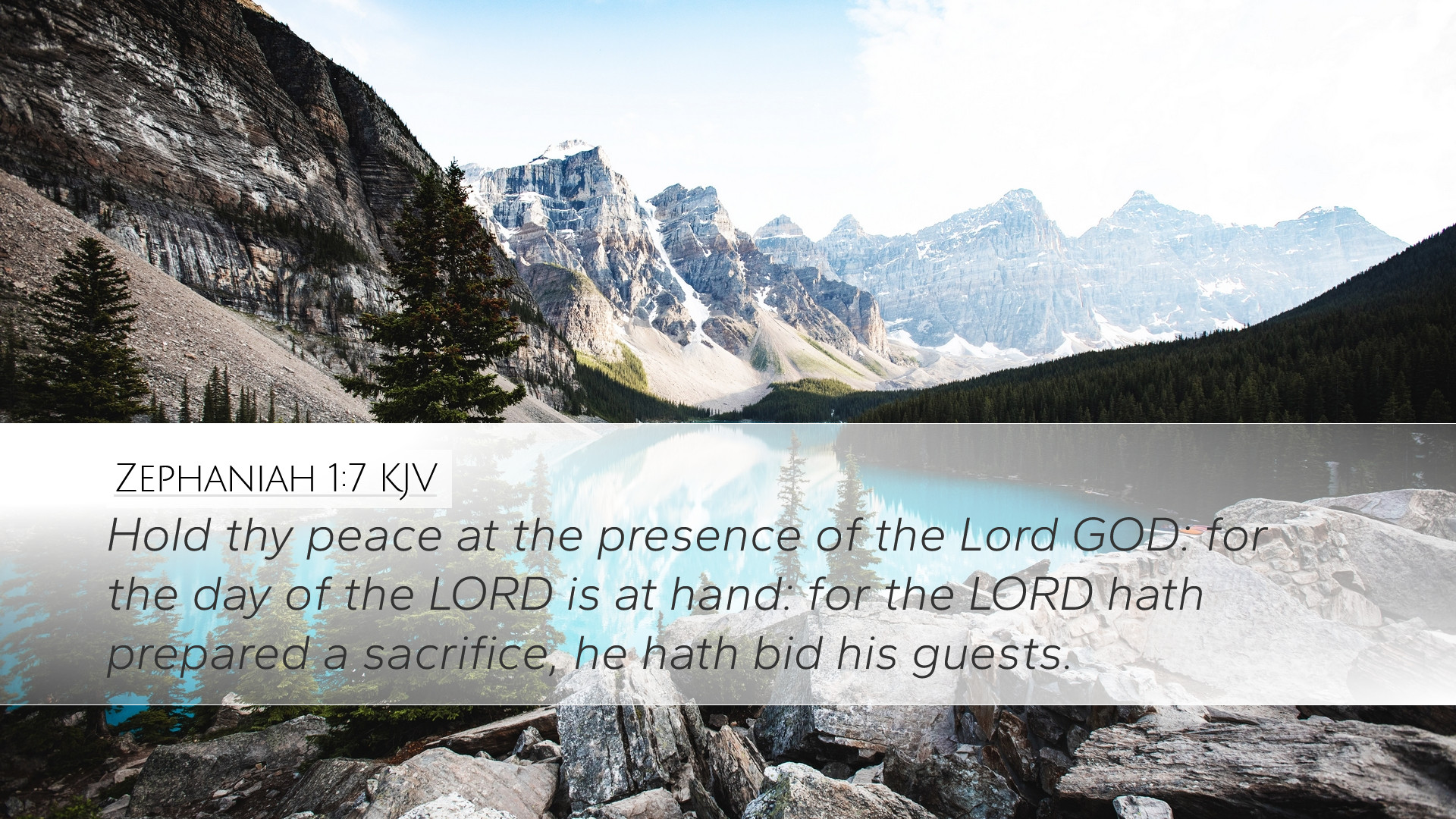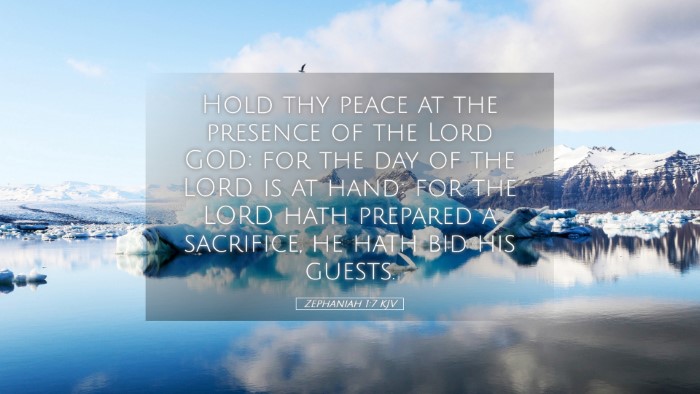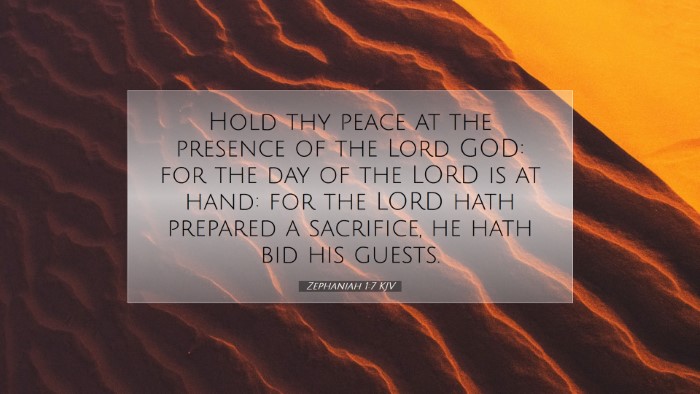Old Testament
Genesis Exodus Leviticus Numbers Deuteronomy Joshua Judges Ruth 1 Samuel 2 Samuel 1 Kings 2 Kings 1 Chronicles 2 Chronicles Ezra Nehemiah Esther Job Psalms Proverbs Ecclesiastes Song of Solomon Isaiah Jeremiah Lamentations Ezekiel Daniel Hosea Joel Amos Obadiah Jonah Micah Nahum Habakkuk Zephaniah Haggai Zechariah MalachiZephaniah 1:7
Zephaniah 1:7 KJV
Hold thy peace at the presence of the Lord GOD: for the day of the LORD is at hand: for the LORD hath prepared a sacrifice, he hath bid his guests.
Zephaniah 1:7 Bible Commentary
Commentary on Zephaniah 1:7
Verse: "Hold thy peace at the presence of the Lord God: for the day of the Lord is at hand: for the Lord hath prepared a sacrifice, he hath bid his guests." (Zephaniah 1:7)
Introduction
In this verse, the prophet Zephaniah delivers a profound message emphasizing the significance of reverence before God. The phrase "Hold thy peace" calls for a somber attitude, reflecting a time of judgement soon to come. In examining this verse, we draw insights from various public domain commentaries including those of Matthew Henry, Albert Barnes, and Adam Clarke.
Exegesis of the Verse
Zephaniah's admonition serves as an urgent reminder of God's impending judgement. The context of this book highlights Israel's prevailing immorality and idolatry, which warrant divine retribution.
Hold Thy Peace
Matthew Henry notes that the command to "hold thy peace" is an acknowledgment of the gravity of the moment. In the presence of God, there is a recognition that human speech falls short; silence becomes a solace and an acknowledgment of His sovereignty. It reflects an attitude of humility and reverence crucial for those awaiting God's judgement.
The Day of the Lord
In this text, "the day of the Lord" symbolizes a time of reckoning. Albert Barnes elaborates that this phrase is used throughout scripture to denote significant divine intervention in history, particularly in acts of judgement and redemption. For the ancient Israelites, this meant the culmination of their rebellious actions, resulting in divine chastisement.
Prepared Sacrifice
The mention of a "sacrifice" signifies that God has made preparations for judgement. Adam Clarke interprets this imagery as representing the nations and sinners who are marked for judgement, likening them to sacrificial offerings destined for destruction. This sacrificial element underscores the seriousness of the scenario the people face—an unavoidable accounting for their choices.
Theological Implications
This verse encompasses rich theological themes, including the nature of God as both a loving deity and a righteous judge. The urgency communicated in "the day of the Lord is at hand" serves as a wake-up call to the complacent and a warning to the wicked.
Call to Reverence
In reflecting upon the significance of silence before God, we see a call for introspection. Matthew Henry emphasizes that in our assemblies of worship, we should embody this stillness in recognition of God's holiness. This silence is not merely the absence of noise; it is the act of focusing our hearts and minds on the presence of God.
Accountability and Judgement
The concept of accountability is prevalent in this verse. Albert Barnes stresses that every person will ultimately answer to God for their actions. This notion should spur Christians toward righteous living, knowing that the day of judgement is not a distant reality but a present and imminent concern.
Grace Amidst Judgement
Though the passage speaks of judgement, Adam Clarke also touches on the theme of grace. The preparation for a sacrifice may imply that God, in His mercy, has provided a means for reconciliation, even amidst impending judgement. This duality of justice and mercy is a cornerstone of the Gospel.
Practical Application
As we digest the implications of Zephaniah 1:7, several applications resonate with pastors, theologians, and students of scripture.
- Reflective Worship: Cultivating an attitude of reverence in worship settings can facilitate deeper encounters with God's presence.
- Emphasizing Accountability: Pastors are encouraged to instill in their congregations an understanding of personal accountability before God.
- Balancing Justice and Grace: Sermons should reflect the balance of God's justice and mercy, portraying Him as a righteous judge who also grants grace.
- Active Readiness: Believers should live in a state of readiness, grounded in their faith, fully aware that "the day of the Lord" awaits.
Conclusion
Zephaniah 1:7 stands as a powerful reminder of the approach of God's judgment and the essential nature of silence and reverence in His presence. Through the insights of esteemed commentators, we gain a multi-faceted understanding of the text that encourages both solemnity and hope. Let us heed Zephaniah's call to hold our peace, prepare our hearts, and anticipate the day of the Lord with sincerity and faithfulness.


